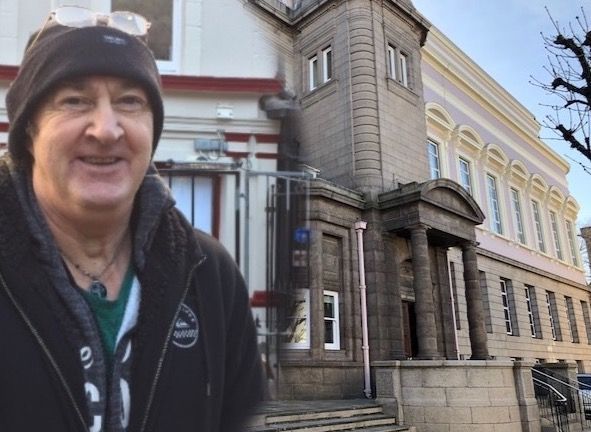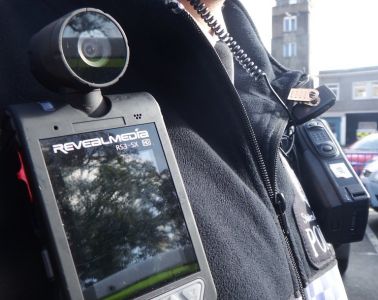

A music teacher who was yesterday found to have been wrongly convicted of assaulting a builder says he’s relieved at now no longer being "branded as a criminal."
Stopping to speak briefly on the Royal Court steps yesterday afternoon after an appeal hearing, Frank O’Neil said he was glad that “...after 18 months it’s all over, I’ve had enough of courts."
His lawyer, Advocate James Bell, who successfully fought to get the conviction quashed, was also pleased with the outcome. He urged the court that if they had any "lurking doubts" about the Magistrate’s Court's earlier ruling, or that if they felt it was "unsafe" or "unsatisfactory," they had to overturn it.
He’d put forward a number of arguments to support his claims of a miscarriage of justice, including the allegedly incompetent actions of a police officer who’d ‘lost’ footage he’d shot using a body cam, because he never uploaded it.

Pictured: Mr O'Neil's advocate argued that 'lost' police footage from a body cam led to a miscarriage of justice.
Back in June last year, the Magistrate’s Court found Mr O’Neil guilty of punching a builder who was renovating a property that backed onto his home in Clearview Street in town.
Mr O’Neil claimed he went to the property because of the noise, and wanted to find out when it was going to finish; but that he was attacked, and that the three builders then ganged together to claim he had been the aggressor.
The builders, however, said Mr O’Neil was the troublemaker and that he punched, and then tried to pull one of them down the stairs. They also told the court that there was no noise - something the Magistrate said he found hard to believe, questioning why Mr O’Neil would have left the comfort of his own home to go and complain, if that was the case.
Criticising the original trial, Advocate Bell said that the court wasn’t given all the evidence; that Mr O’Neil’s lawyer could have done more to advance his case; that the police ‘lost’ evidence; and that the Magistrate hadn’t fully taken Mr O’Neil’s good character into account.
Although the court had been told Mr O’Neil had mobility issues with his left arm during the original trial, Advocate Bell says it wasn’t fully aware of just how restrictive this was. His doctor wasn’t called to give evidence, and his original lawyer didn’t get a specialist to assess the injury. An orthopaedic specialist, Professor Warwick, later examined Mr O’Neil. He reported that he can’t fully straighten his left elbow and also has shoulder problems. It’s claimed this means he couldn’t physically have carried out the attacks he was alleged to have done. Giving evidence in the original trial, all three prosecution witnesses claimed Mr O’Neil punched and pulled the victim using his left arm.

Pictured: Outside the Clearview Street properties, where the assault occurred. (Google Maps)
Advocate Bell also believed the Relief Magistrate failed to fully take Mr O’Neil’s ‘good character’ into account. Legally, if someone is of ‘good character’ and has no previous convictions, as was the case with Mr O’Neil, the court has to consider if what is being alleged seems plausible given the person’s normal behaviour. The principle particularly comes into play during cases in which it's one person's word against another's.
Advocate Bell said the initial account the builders gave of what happened – the one that was allegedly recorded on the police officer’s body cam – was very different from what they later told the police, and would have supported Mr O’Neil’s claims. That’s why Advocate Bell said not having the footage was so devastating.
The police have since written to Mr O’Neil apologising for the ‘lost’ footage, saying the officer’s failure to upload the footage and flag it for evidential purposes was contrary to States of Jersey Police policy, and that the officer is no longer employed by them.
Defending the original decision, Advocate Julian Gollop told the court he believed there was no reason to overturn the conviction. He argued the court had been given all the relevant evidence, and that even if the ‘new’ evidence being presented had been available it wouldn’t have made any difference.
Passing judgement, the Deputy Bailiff quashed the conviction, making specific reference to the medical evidence. Whilst he couldn’t be sure it would have swayed the original court’s decision, it might have, and, if there was doubt, the conviction was unsafe.
The Royal Court of Appeal's full decision will be published at a later date.
Comments
Comments on this story express the views of the commentator only, not Bailiwick Publishing. We are unable to guarantee the accuracy of any of those comments.